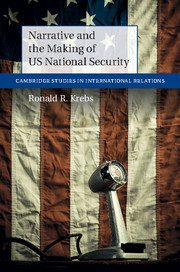Crossref Citations
This Book has been
cited by the following publications. This list is generated based on data provided by Crossref.
Krebs, Ronald R.
2015.
How Dominant Narratives Rise and Fall: Military Conflict, Politics, and the Cold War Consensus.
International Organization,
Vol. 69,
Issue. 4,
p.
809.
Parkinson, Sarah E.
2016.
Money Talks: Discourse, Networks, and Structure in Militant Organizations.
Perspectives on Politics,
Vol. 14,
Issue. 4,
p.
976.
Busby, Joshua W.
2016.
Ronald R. Krebs Narrative and the Making of US National Security (Cambridge, Cambridge University Press, 2015).
International Politics Reviews,
Vol. 4,
Issue. 2,
p.
108.
Kandel, Maya
2016.
Politique étrangère et soutien populaire : la fin du consensus et du siècle américain ?.
Revue française d’études américaines,
Vol. N° spécial 145,
Issue. 4,
p.
44.
Colley, Thomas
2017.
Is Britain a force for good? Investigating British citizens’ narrative understanding of war.
Defence Studies,
Vol. 17,
Issue. 1,
p.
1.
Spencer
2017.
Images, visions and narrative identity formation of ISIS: a reply.
Global Discourse,
Vol. 7,
Issue. 2,
p.
260.
Holland, Jack
and
Fermor, Ben
2017.
Trump’s rhetoric at 100 days: contradictions within effective emotional narratives.
Critical Studies on Security,
Vol. 5,
Issue. 2,
p.
182.
Gadinger, Frank
and
Yildiz, Taylan
2017.
Erzählen.
p.
158.
Lysychkina, Iryna
2017.
The Image of Security Sector Agencies as a Strategic Communication Tool.
Connections: The Quarterly Journal,
Vol. 16,
Issue. 3,
p.
5.
krebs, ronald r
jones, michael d
aronoff, myron j
and
shenhav, shaul r
2017.
analysing social narratives.
European Political Science,
Vol. 16,
Issue. 4,
p.
577.
Bentley, Michelle
2017.
The intervention taboo(s): Strategy and normative invalidation.
Review of International Studies,
Vol. 43,
Issue. 3,
p.
557.
Schmitt, Olivier
2018.
When are strategic narratives effective? The shaping of political discourse through the interaction between political myths and strategic narratives.
Contemporary Security Policy,
Vol. 39,
Issue. 4,
p.
487.
Kruck, Andreas
Oppermann, Kai
and
Spencer, Alexander
2018.
Political Mistakes and Policy Failures in International Relations.
p.
1.
Jackson, Van
2018.
Buffers, Not Bridges: Rethinking Multilateralism and the Resilience of Japan-South Korea Friction.
International Studies Review,
Vol. 20,
Issue. 1,
p.
127.
Tama, Jordan
2018.
Tradeoffs in defense strategic planning: lessons from the U.S. Quadrennial Defense Review.
Defence Studies,
Vol. 18,
Issue. 3,
p.
279.
Karp, Regina
2018.
Identity and anxiety: Germany’s struggle to lead.
European Security,
Vol. 27,
Issue. 1,
p.
58.
Mouton, Nicolaas T. O.
Kjærbeck, Susanne
and
Rasmussen, Rasmus Kjærgaard
2018.
The International Encyclopedia of Strategic Communication.
p.
1.
Dinneen, Nathan
2018.
The Corinthian Thesis: The Oratorical Origins of the Idea of the Balance of Power in Herodotus, Thucydides, and Xenophon.
International Studies Quarterly,
Vol. 62,
Issue. 4,
p.
857.
Bueger, Christian
and
Gadinger, Frank
2018.
International Practice Theory.
p.
69.
Oppermann, Kai
and
Spencer, Alexander
2018.
Narrating success and failure: Congressional debates on the ‘Iran nuclear deal’.
European Journal of International Relations,
Vol. 24,
Issue. 2,
p.
268.





